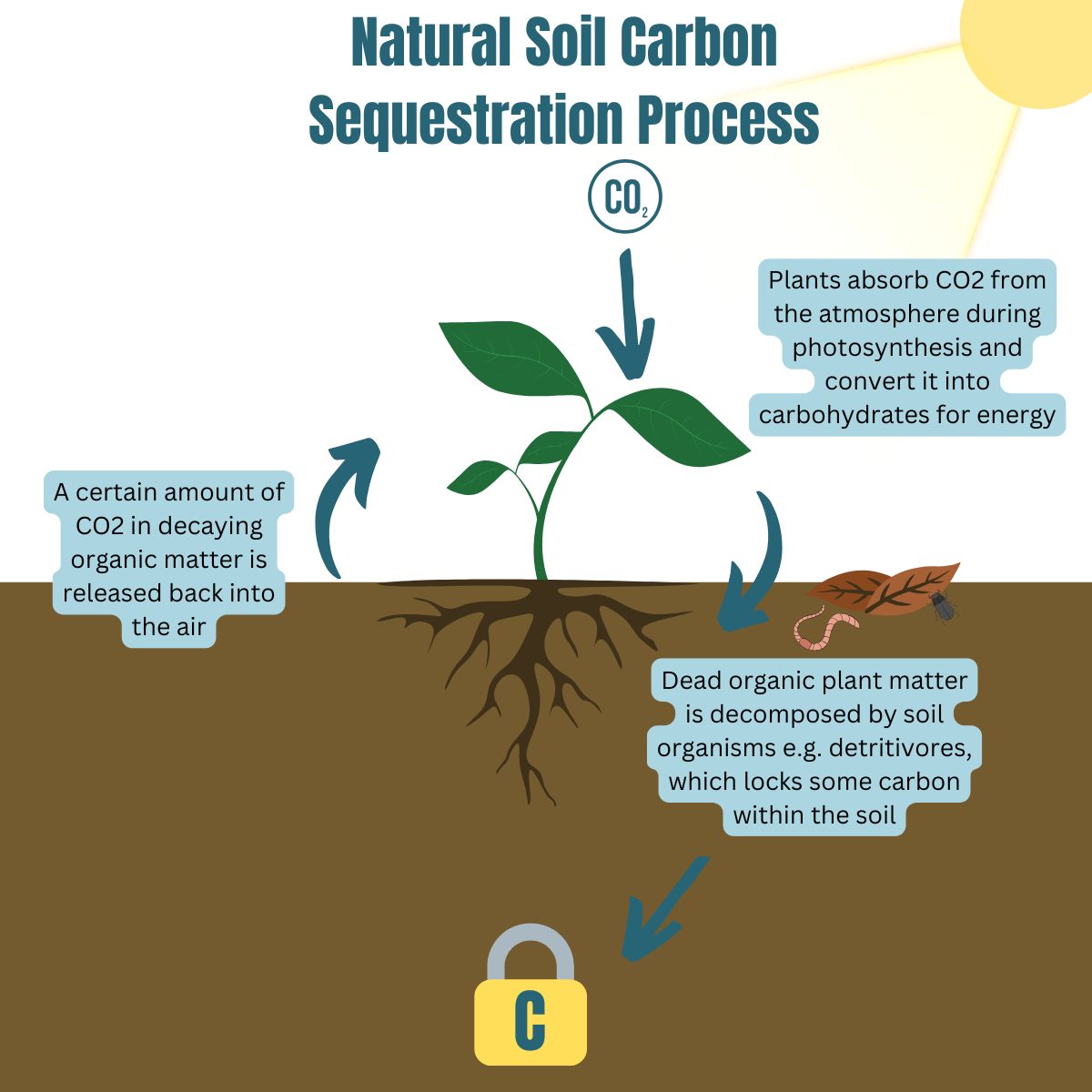12 December 2024 by Georgie Tugwell
Our soils are incredibly important – they support ecosystems, regulate climate and sustain flora and fauna. Additionally, ecosystem services such as nutrient cycling, water retention and carbon storage all depend upon their functionality. In recent years, soil biodiversity and carbon sequestration capacity has brought to light its importance in the fight against global warming and nature declines, respectively. Soil restoration initiatives are now gaining traction as awareness of how critical soils are for reducing atmospheric carbon dioxide (CO2) and driving ecosystem recovery is increasing.
At present, the top 2 metres of soil globally sequesters five times the quantity of carbon found in all terrestrial vegetation, making it one of the largest carbon reservoirs on Earth. So, how does carbon enter the soil and how do we ensure it stays locked up? Soil carbon sequestration begins with plant photosynthesis; plants capture carbon dioxide from the atmosphere and convert it into carbohydrates, see figure 1. A portion of carbon held in plant tissue then enters the soil when dead organic matter is decomposed by soil organisms, it may then remain beneath the ground, locked up for decades or even centuries which helps reduce atmospheric carbon levels.

Figure 1: Schematic illustrating the natural soil carbon sequestration process
When healthy, soils act as sinks by locking vast quantities of carbon away and reducing atmospheric CO2 levels, however, degraded soils do the opposite. According to the Intergovernmental Panel on Climate Change (IPCC), soil degradation contributes approximately 1.7 billion tons of CO2 to the atmosphere annually. Unfortunately, widespread overgrazing, tilling and poor land management are deteriorating soil quality on a global scale, converting soils from sinks to major sources of carbon emissions. As if this isn’t bad enough, soil erosion, loss of organic matter and reductions in fertility are also direct consequences of these practices which drive additional negative environmental and socioeconomic changes.
Soil restoration methods are therefore necessary, not just for climate but also for nature and food security, as they can mitigate the loss of and recover soil organic carbon stocks by improving soil structure and carbon content. Projects that restore soils are now recognised as critical solutions to both climate change and biodiversity loss with international programmes, such as the UN Decade on Ecosystem Restoration (2021-2030) and the 4 per 1000 Initiative, focused on improving soil health and carbon sequestration.
Biodiversity and ecosystem functionality are also linked with soil health. Soil provides essential nutrients for plants and comprises 25% of global biodiversity – with 50 billion microbes found in just 5 grams of soil. Maintaining and restoring soil health has many benefits for nature, which are summarised below:
Soil biota are key for soil aeration, structure, water infiltration and nutrient cycling – they play important roles in cycling elements such as C and N, ensuring they are bioavailable to plants and, in turn, improving soil fertility. Soil degradation must be avoided or reversed as it wipes out communities of these microorganisms, starting a vicious cycle as biodiversity loss further depletes soil quality.
Degraded soils struggle to retain water, which can lead to flooding or droughts. Soil restoration methods such as adding organic matter, rotational grazing, planting cover crops, and using contour farming techniques improve soil structure, which enhances its ability to hold water and prevent erosion – this is also important for mitigating the impacts of increasingly frequent extreme weather events linked to climate change.
Soil restoration improves nutrient content which can boost crop yields and enhance food security. Techniques such as crop rotation, agroforestry, and the use of organic fertilizers can restore soil fertility and improve the productivity of agricultural lands. This allows for increased food production while maintaining environmental balance.
Healthy soils are critical for the restoration of ecosystems like forests, wetlands, and grasslands. These ecosystems provide important services such as carbon storage, water filtration, and habitat for wildlife. Soil restoration practices can help re-establish the hydrological functions of wetlands, restore forests through replanting efforts, and improve soil quality for grassland recovery, which supports biodiversity.
Several techniques can be used to restore soil health and improve its carbon sequestration capacity. Methods do vary depending on the specific degradation issue and ecosystem type, but common practices include:
Soil restoration is a key strategy for mitigating climate change and promoting biodiversity recovery. There are many reasons for maintaining and restoring healthy soils e.g. enhancing carbon sequestration, restoring ecosystems, and boosting agricultural productivity, and soil degradation must be halted and reversed to maintain global food security and decelerate climate change. Investing in long-term soil restoration initiatives will be essential for meeting ambitious global climate and biodiversity goals – supporting nature-based solution projects that incorporate soil restoration techniques into their design will help drive positive change for our planet